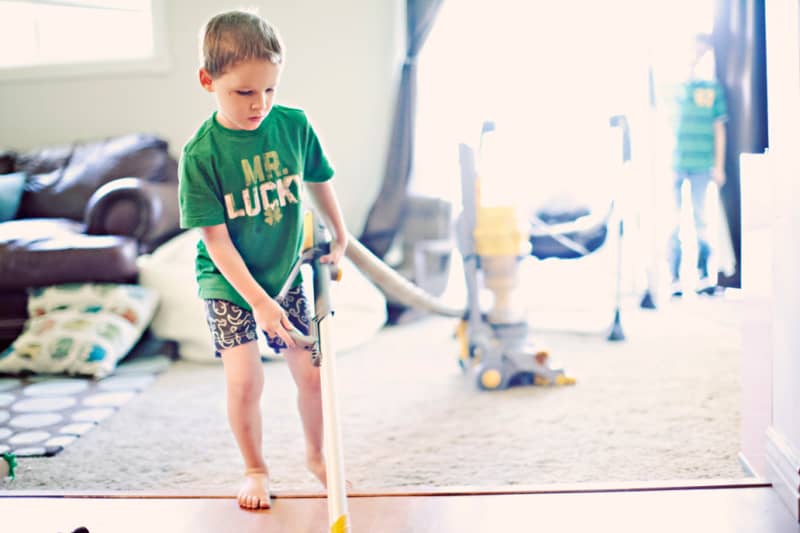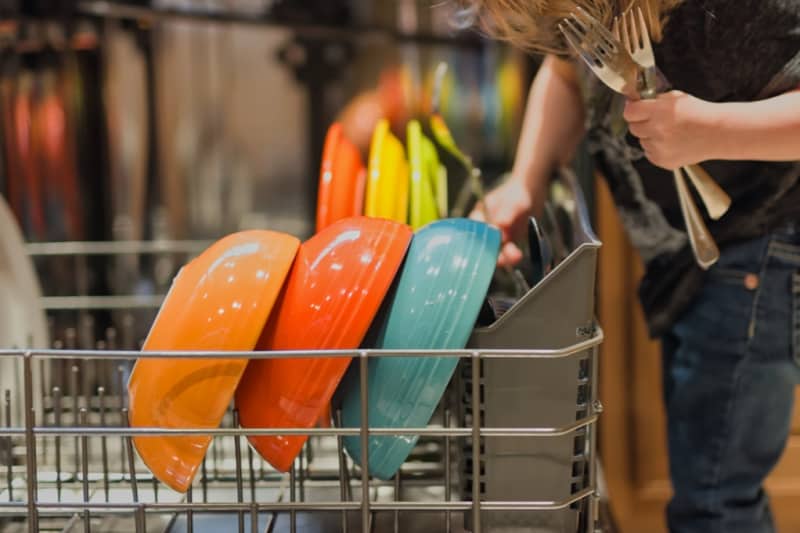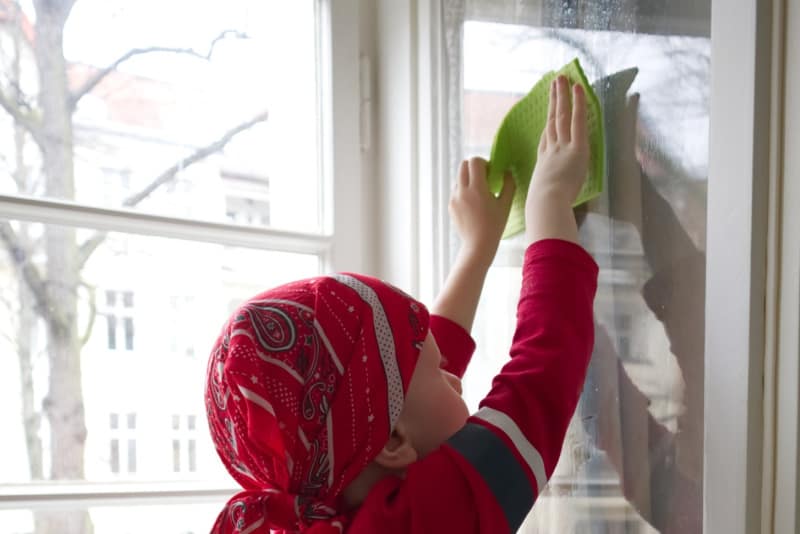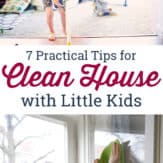Cleaning with kids – it’s possible! How to keep a clean house with kids, even if you’re short on time and exhausted. Plus, learn seven easy ways to get your kids involved.
I love getting the kids involved in some spring cleaning (they even cleaned in the toddler years).
It’s the perfect opportunity to help them develop life skills, so they can start practicing now what they will eventually need to manage on their own as adults.
And since we are moving from California to Virginia this summer, it’s a total win-win for me to have them participating in extra cleaning and building home maintenance and responsibility skills.

Cleaning With Kids…We Got This!
Chores and cleaning are two words that can immediately illicit moans and whining from a child.
“But mommmmmm, that’s too hard for me!”
“I can’t do it.”
“Really, bro? I can’t do all this?!”
(And yes, I’ve officially reached the parenting phase where my son will, at times, refer to me as “bro.” Bless.)
Getting kids involved in household responsibilities is really. dang. hard.
But over the years, I’ve learned a lot about gaining success in the cleaning with kids department.
1. Replace “chores” with “family contributions.”
Chores = work.
There are a lot of negative connotations with the word chores, which is why it’s best to avoid it altogether.
Cleaning = more work.
The same can be said about cleaning. No one likes to clean (except for me ☺️). Perspective is everything, and doing a few word swaps can make a big difference in a child’s reaction.
Family contributions = a sense of belonging.
I like to create an atmosphere of working together as a team in our home. It’s this idea that we all try to help each other and contribute in some way, even when we are not told or asked. This is a HUGE life skill to develop long-term with kids.
Using a word like “family contributions” instead of “chores” can help kids take ownership over tasks in the home, knowing they are valued by the whole family.
Other words like “tidy” or “refresh” or “reboot” are also very helpful swaps. Saying, “It’s time to reboot your room” is far better received by a child than “Go clean your room.”
2. Only give two tasks at a time.
It is very overwhelming to give a child a long checklist of tasks, or worse, tell them one big vague task like “Go clean your room.”
I guarantee you and your child have completely different definitions of clean.
Specific tasks bring success!
Also, learning to break down one big task into a many smaller tasks is a life skill that takes quite a bit of time to develop. Children do not innately know how to do this, and they will need some help from you.
- I typically start with giving each child two tasks.
- Then, tell your child to return when they are done to receive two more tasks.
We love to use tools like these room-by-room cleaning checklists and chore cards. However, if I give a complete checklist I will say, “Complete two items on your checklist and come back.”
If I use chore cards, I will only give two at a time for a bigger day of cleaning.
As your child gets used to performing a specific family contribution, they will get faster and eventually take more initiative without prompting.
3. Remember it’s a long-term game.
In my experience, I see far more success helping kids to build skills a little each month and year. I’m a person who wants everything done yesterday. If you are like that too, I get it.
I had to shift my mindset and realize that if they don’t take out the trash on Monday night at 5 pm when I command them to do so, it literally will not matter in five years.
Take out the trash – what will matter in five years:
- their ability to recognize the trash is getting full and to take it out.
- understand the day trash is picked up by the trash service and put the trash bin out.
- being able to sort recycling from trash.
- and more.
Can you see the difference?
I appreciate when my kids do exactly as I say immediately. Who wouldn’t?
This approach, unfortunately, leaves me in the micro-manager role of my kids indefinitely. It doesn’t help kids understand what went into the request or decision.
So when you help a child learn to read the trash day calendar, set a reminder, and recognize when the trash may need to go out, you are participating in the long-term success game.
4. Allow kids to make decisions about when and how.
Falling into bribes and threats to “make” kids do chores around the house is extremely tempting. It also tends to backfire, creating more resistance and whining in the long run.
When kids feel powerless over something, they will dig in their heels and resist.
On the flipside, when kids feel in control and have decision making power, they are more likely to cooperate with you.

Here are a few cleaning decisions our kids make:
- Choose the day of the weekend (Sat or Sun) to complete their family contributions.
- Choose the time of day (morning, afternoon, evening).
- Choose specific tasks from a longer list of tasks.
- Choose a specific room to work on from a list of rooms.
- Choose the amount of time allowed for completion (kids love to make their own challenges).
5. Baby wipes – the amazing cleaning hack for kids.
Have you seen kids clean?
It’s all one cross-contaminated germ fest where the toilet rag gets used to clean the kitchen counters.
This is not to be negative about kids. It is simply the truth that they have not perfected such life skills yet.
Again, we’ve got to help them along the way. And one tool I love to use for this is…baby wipes.
Here’s WHY I love baby wipes for cleaning with kids:
- non-toxic and safe for little hands
- single use
- already wet and ready to clean
- always available
(Side note: I’m not big on chemical cleaners. Many cleaners are known carcinogens, and skin being the most absorptive organ of the body…it’s not a good situation. Often, water is sufficient to get the job done for kids.)
Here’s HOW I get kids cleaning with baby wipes:
- I get a large pack of water wipes delivered every few months via subscribe and save.
- Put packs in almost every room (convenience with kids and cleaning make a big difference).
- Teach kids how to use them to dust or tidy up a bathroom.
- Baby wipes are also great to use as a “hand swiffer” for kids.
- Have kids use them to clean baseboards.
Using a wipe like this eliminates issues you may have when cleaning with kids.
6. Affirm your child’s accomplishments.
All kids act according to who they believe they are. So when your child organizes their toys, you can say, “You put all your toys in specific bins. That shows you’re organized.”
The child can then see this trait in themselves, and here’s the BEST part: Your child’s future actions will be based out of that trait.
These are called STRENGTHs in Language of Listening®, a three part framework I use and teach to parents.
When you recognize and affirm the qualities and behaviors you like in your child, your child will start to show you more of those!

7. Focus on independence and self-directed behavior over perfection.
Rarely will a child clean to the highest standard. Our standards are simply different than our child’s standards.
That’s okay because perfection is not a predictor of long-term success in chores or home management.
What will predict long-term success in a child’s skills?
- Learning how to do a skill independently.
- Learning how to be self-directed in any given task.
I avoid re-doing any cleaning my child completed, and instead offer constructive feedback and support for improvement (Yes, I do help my kids when they need it, but I don’t fix what they’ve already completed). This helps to build your child’s independence and see that they are capable.
Print this free printable!
This post comes with a free printable to give you an easy step-by-step guide to raise independent kids. Plus, remember what independent skills are age-appropriate for your kids!
Here’s a sneak peek…
Download Your Free Printable
- Download the checklist. You’ll get the printable, plus join my weekly parenting newsletter!
- Print. Any paper will do the trick, but card stock would be ideal.
- Place it on your refrigerator. Use it as a quick reference to keep parenting simple!
Want more on parenting?
- 100+ Printable Chore Cards for Kids to Teach Responsibility
- 47 Encouraging Phrases for Kids You Have to Try
- 75+ Simple Ways to Promote Independence in Kids (aka Life Skills)
- How to Build Cooperation and Independence Using a Printable Daily Schedule for Kids
I've created a free email series just for you! If you are struggling with finding a routine, rhythm or schedule, this email series will help you find one that will work for YOUR family. Yes, really. I've seen my sample routines work time and time again for parents. I know it can work for you too.
This free email series will help you:
- Free sample routines for your child
- Best morning routine tips and tricks your kids will actually follow
- All-time favorite parenting hacks for getting more cooperation at bedtime
- Step-by-step guide for using a printable daily schedule with kids










Thanks for the practical information in this timely post! My favorite is your suggestion to have kids use baby wipes for cleaning—safe and effective.